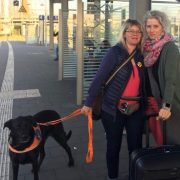Living with LHON: Support and friendship fights fear and isolation

When someone is told they have a rare disease – particularly one like LHON that strips people of their sight — it can be an isolating experience.
Christiane Trenkner, whose sister Sonja was diagnosed with Leber’s hereditary optic neuropathy (LHON) in 2013, knows this only too well.
That’s why she is working with other families affected by the disease to turn a small support group into a fully-fledged foundation.
Sonja’s story
LHON has a huge impact on every aspect of a person’s life, from their health and wellbeing to their relationships and work.
The rare genetic disease, which is passed down through the maternal line, tends to leave sufferers with no central vision within months of onset, and it has consequences for the whole family.
Remembering when Sonja was first told she had the disease, Christiane said: “When you get diagnosed with LHON, your entire life is turned upside down.
“Suddenly you have to adapt to the fact that you are becoming blind. That means you will have to face some major obstacles such as changing your job, if you can, or having to learn Braille. Your everyday life changes dramatically.”
This was particularly true in Sonja’s case. After receiving the diagnosis, her husband filed for divorce and, when she was no longer able to work, she lost her house and had to move to another city.
Her independence and autonomy took a hit when she had to stop driving and give up her treasured hobby of riding horses.
It was not an easy time, but she has drawn strength and support from her family and friends, as well as fellow LHON patients.
Sonja relies on speaking devices, like kitchen and bathroom scales and her mobile phone, and uses reading assistant software. She has been through a white cane training course and developed new skills to organise and orientate herself in her everyday life.
The emotional side of things, however, has been more difficult to cope with – not just for Sonja but for the whole family.
A family diagnosis
When they were growing up, the sisters’ grandmother was registered blind, but it wasn’t until Sonja was diagnosed that they realised it had been LHON.
Christiane said: “They always told us that this disease was no danger for us and that we shouldn’t be concerned. But when Sonja lost her vision, we started researching on the internet and found out we should all be screened.”
The testing revealed that Christiane also carries the faulty gene. It means that both her children, Ramus, 19, and 14-year-old Katrine, are at risk of developing LHON.
“Me and my family were very concerned with helping my sister Sonja to organise herself. In addition, we really worry that one of us could go blind, too,” said Christiane, demonstrating how the news had added a whole new dimension to the family’s struggle to cope.
The biggest challenge, she said, was learning to live with “an invisible sword over your head”, knowing that the disease could develop at any moment.
“I think about my children every day. I passed these inactive genes to them. They have to live with it, and they are in danger of passing it to their children too,” she said.
“I would give a lot to take this burden from them. Sometimes it is difficult for me to motivate them to lead a healthy lifestyle and to take more vitamins in order to reduce the danger of activating the genes.”
Arbeitskreis LHON
Christiane’s advice to anyone going through a similar experience is to get psychological support and build a support network.
The family found solace in Arbeitskreis LHON, or the LHON working group. The loose collection of German families, all of whom are affected by LHON, are planning on becoming an official association later this year.
Currently, members meet annually and keep in constant contact via Facebook, phone and email.
“For us it was very helpful to find others with this disease and to exchange knowledge and experiences with them. I would advise people to look out for others,” said Christiane.
Christiane is keen to help set up the foundation so that more people can be helped.
The team wants to work with groups such as Pro Retina and other rare disease associations. But, Christiane added, it is really important to have something that is focused on the unique struggles and issues facing people living with LHON and their families.
“In Germany at the moment, we only have an association for blind people in general. Sometimes this is not very helpful for us, because they are not focused on our disease,” she said.
“Our main focus will be psychological support and social interaction for our future members. For us, it will be a success if friendships develop and LHON patients are connected to each other.”
Taking control
Christiane and her family are part of Germany’s growing LHON community — a community that is intent on ensuring everyone has access to the information and friendship people need to take back control of their lives.
A diagnosis of LHON turns lives upside down, she said, and people need support as they clamour to adapt to an unknown future.
To read further articles in this series please visit our Disease Spotlight: LHON channel produced by pharmaphorum in conjunction with Santhera Pharmaceuticals
About the interviewee
[caption id="attachment_53420" align="alignleft" width="180"] Christiane and her sister Sonja[/caption]
Christiane and her sister Sonja[/caption]
Christiane lives in Germany and has two children, Rasmus, 19 and Katrine, 14. She has been involved with LHON since 2013 when her sister began to have visibility problems. As one of the “sighted” members of Arbeitskreis LHON, she tries to support and help others. In her spare time she enjoys playing volleyball.












